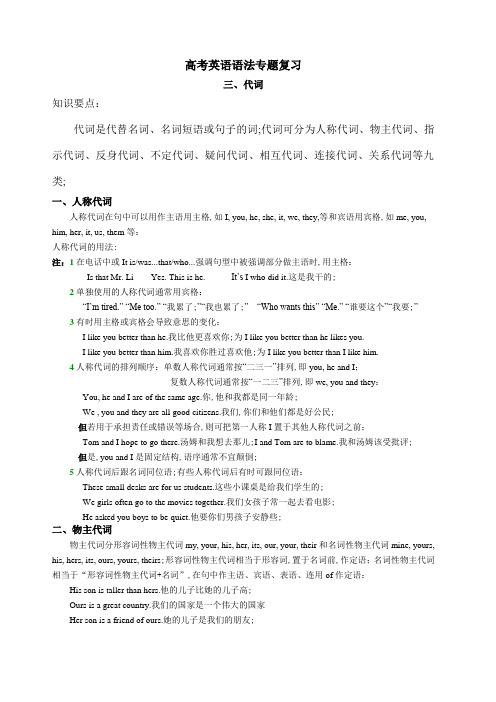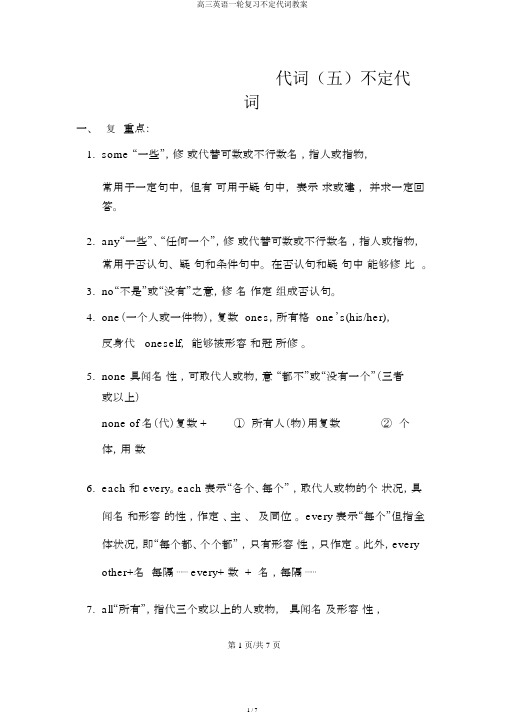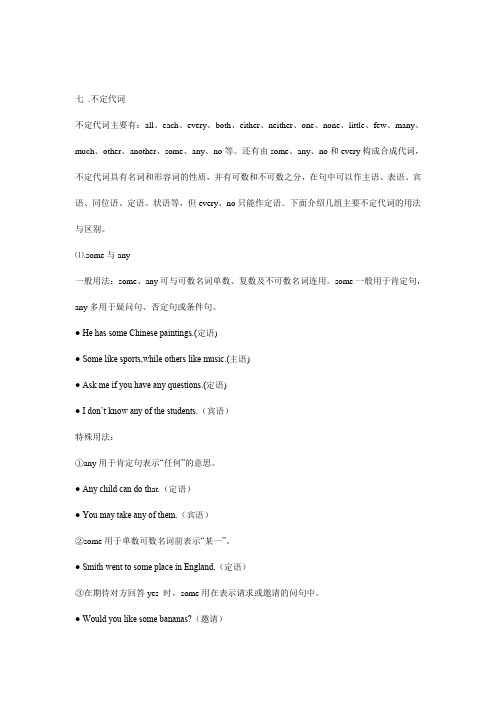2006年江苏高考英语专项复习 不定代词
高考英语语法专题复习代词

高考英语语法专题复习三、代词知识要点:代词是代替名词、名词短语或句子的词;代词可分为人称代词、物主代词、指示代词、反身代词、不定代词、疑问代词、相互代词、连接代词、关系代词等九类;一、人称代词人称代词在句中可以用作主语用主格,如I, you, he, she, it, we, they,等和宾语用宾格,如me, you, him, her, it, us, them等:人称代词的用法:注:1在电话中或It is/was...that/who...强调句型中被强调部分做主语时,用主格:---Is that Mr. Li ---Yes. This is he. It’s I who did it.这是我干的;2单独使用的人称代词通常用宾格:“I’m tired.” “Me too.” “我累了;”“我也累了;”“Who wants this” “Me.” “谁要这个”“我要;”3有时用主格或宾格会导致意思的变化:I like you better than he.我比他更喜欢你;为I like you better than he likes you.I like you better than him.我喜欢你胜过喜欢他;为I like you better than I like him.4人称代词的排列顺序:单数人称代词通常按“二三一”排列,即you, he and I;复数人称代词通常按“一二三”排列,即we, you and they:You, he and I are of the same age.你,他和我都是同一年龄;We , you and they are all good citizens.我们,你们和他们都是好公民;但若用于承担责任或错误等场合,则可把第一人称I置于其他人称代词之前:Tom and I hope to go there.汤姆和我想去那儿;I and Tom are to blame.我和汤姆该受批评;但是,you and I是固定结构,语序通常不宜颠倒;5人称代词后跟名词同位语;有些人称代词后有时可跟同位语:These small desks are for us students.这些小课桌是给我们学生的;We girls often go to the movies together.我们女孩子常一起去看电影;He asked you boys to be quiet.他要你们男孩子安静些;二、物主代词物主代词分形容词性物主代词my, your, his, her, its, our, your, their和名词性物主代词mine, yours, his, hers, its, ours, yours, theirs;形容词性物主代词相当于形容词,置于名词前,作定语;名词性物主代词相当于“形容词性物主代词+名词”,在句中作主语、宾语、表语、连用of作定语:His son is taller than hers.他的儿子比她的儿子高;Ours is a great country.我们的国家是一个伟大的国家Her son is a friend of ours.她的儿子是我们的朋友;This is your pen. Mine is in the box.这是你的铅笔,我的在铅笔盒里;注:1 a friend of mine ours, yours, hers, his, theirs结构2 物主代词与own连用;表强调;也可用of one’s own置于名词后作定语:Mind your own business.别管闲事;I saw it with my own eyes.那是我亲眼看到的;I hope to have a room of my own. / I hope to have my own house.我希望有自己的房子;三、指示代词指示代词是用来指代或标记人或事物的代词,表示“这个,这些”“那个,那些”;在句中可作主语、宾语、表语、定语;单数:this, that;复数:these, those;为了方便学习将such,so也归于此类;I like these and he likes those.我喜欢这些,他喜欢那些;What I want to say is this.我想说的就是这点;注:1 指示代词用作主语和定语时,可指人或物;用作宾语和表语时,只指物;如:This is my father. 作主语,指人Do you know this作宾语,指物,译为“你知道这个情况吗2 刚提到的或已经完成的事情时用that,但是若要指下文将要发生或将要提到的事情通常用this:She married Jim, and that surprised me.她嫁给了吉姆,这使我感到很吃惊;I want to know this: Is he healthy我想知道这一点:他是否很健康;3 在打电话时,通常用this指自己,用that指对方:Hello. This is Jim. Is that John喂,我是吉姆,你是约翰吗4 such指代前面所述的这样的人或事;如:Such is Albert Einstein, a famous physicist, but a simple man. 这就是艾尔伯特,爱因斯坦,......5 so代替一个句子或短语表达的事情;a.在believe,expect,suppose,imagine,think等词后用so代替前文观点;表肯定、否定=not均可;b. 用于表示肯定的hope,I’m afraid后,代替前文提出的观点;四、反身代词反身代词是oneself根据所指词的人称、性别、单复数等变化的词单数:myself, yourself,himself, herself, itself, 复数:ourselves, yourselves, themselves,在句中可作宾语、表语、同位语,不能作主语; 注:1用作同位语加强被修饰词的语气,紧放在被修饰名词后,或句末:The box itself is not so heavy.箱子本身并不重;You yourself said so. / You said so yourself.你自己是这样说的;2用作宾语动词或for,of, in, by, to等介词的宾语:She could not make herself understood.她不能使别人听懂她的话;You’ll have to see if he has come for yourself. for one self 亲自,为自己The computer may shut off of itself. of oneself 自动的You shouldn’t leave the child at home by herself. b y oneself 独自,单独Jim isn’t bad in himself, but he likes playing tricks on others. in one self 本身He likes a table to himself. to oneself 独自占用3 用作表语:有时用于be, feel, seem, look等后作表语表示身体或精神处于正常状态:The poor boy was myself.那个可怜的孩子就是我自己;The ones who really want it are ourselves.真正想要它的是我们自己;I'm not quite myself these days.我近来身体不大舒服;I'll be myself again in no time.我过一会儿就会好的;4 含有反身代词的动词短语:devote oneself to=be devoted to 专心于;lose oneself=be lost in 迷失;seat oneself= be seated 坐下; express oneself 表达某人的思想; say for oneself 为自己找借口;say to oneself 心想; talkto oneself 自言自语; feel oneself 觉得正常; come to oneself 苏醒;五、疑问代词疑问代词包括who, whom, whose,which, what,在句中可用作主语、表语、宾语、定语等:1、who与whom的用法:前者为主格,用作主语、宾语,后者为宾格,用作宾语;Who spoke at the meeting Whom are you talking about口语中或作宾语的whom位于句首时,通常可用who代替,但whom前有介词时除外:Whom is the letter from2、whose的用法:表示“谁的”,既可用于名词前作定语,也可单独使用;在句中作主、宾、表、定语;Whose is better, yours or hers作主语Whose do you love better, yours or hers作宾语Tom has already taken his bag is this作表语Whose bag do you like作定语3、what和which的用法:有选择范围时,多用which;无选择范围或不明确时,多用what;拓展:what的习惯用法:1 What...for... 和What for 用于询问原因和目的;---What did you put it into the soup for --- It would improve the taste.你为什么...---I’m going to the grocery store. ---What for We still have enough food in the apartment.为何啊(2)What if...表示假设、建议、征求意见或疑虑;What if it rains while we are on the way(3)What do you mean by...表示愤怒、不满等情绪;What do you mean by shutting the door so loudly(4)What/How about...用于征求对方意见、询问对方的情况;(5)疑问词what构成的固定搭配;So what那又怎么样呢表示不感兴趣或认为不重要What next店员用语还要什么Guess what你猜怎么着用于引起他人的注意What can I do for you你要买借什么4、what和who的区别:一般来说;what问职业、地位等,who问姓名或关系等:Who is he他是谁What is he他是干什么的六、相互代词相互代词只有each other和one another,它们在句中通常只用作宾语:We should help each other.我们应该互相帮助;They respect one another.他们互相尊重对方;The sea and the sky seem to melt into each other.大海和蓝天似乎融为一体;注:1相互代词在句中通常只用作宾语,不可作主语,所以以相互代词为宾语的句子不能变为被动语态;2不要将相互代词误认为是副词,将其用作状语,如可说talk to each other,但不能说talk each other;3相互代词可以有所有格形式:The students borrowed each other's notes.学生们互相借笔记;4有时可分开用:We each know what the other thinks.我们都知道对方的想法;七、不定代词1.不定代词概说;英语的不定代词有all, each, both, either, neither, one, none, little, few, many, much, other, another, some, any, no,few,little, both, enough, every等,以及由some, any, no和every构成的合成代词即somebody, anyone, nothing等;在这些不定代词中,多数都能作主语、宾语、表语或定语,但是代词none以及由some, any, no和every构成的合成代词只能作主语、宾语或表语,不能作定语,而no和every则只用作定语;2.指两者和三者的不定代词;有些不定代词用于指两者如both, either, neither,有的不定代词用于指三者如all, any, none, every,注意不要弄混:Both of my parents are doctors.我的父母都是医生;All of the students are interested in it.所有的学生对此都很感兴趣;There are trees on any side of the square.广场的每一边都种有树;He has two sons, neither of whom is rich.他有两个儿子,都不富有;He has three sons, none of whom is rich.他有三个儿子,都不富有;注:each可用于两者、三者或三者以上,而every只用于三者或三者以上,因此用于两者时只能用each,不能用every;如不能说There are trees on every side of the road.3.复合不定代词的用法特点;复合不定代词包括something, somebody, someone, anything, anybody, anyone, nothing, nobody, no one, everything, everybody, everyone等;它们在句中可用作主语、宾语或表语,但不能用作定语;something, someone等和anything, anyone等的区别与some和any的区别一样,前者一般用于肯定句,后者一般用于否定句、疑问句或条件句参见any & some;具体使用时应注意以下几点:1复合不定代词受定语修饰时,定语应放在它们后面:There is nothing wrong with the radio.这收音机没有毛病;Have you seen anyone anybody famous你见过名人吗2指人的复合不定代词若用作主语,其谓语动词一般用单数,相应的人称代词和物主代词也用单数he, him, his 不一定指男性;但在非正式文体中常用复数代词they, them, their:Everyone knows this, doesn't he don't they人人都知道这一点,不是吗If anybody anyone comes, ask him them to wait.要是有人来,让他等着;3指事物的复合不定代词若用作主语,谓语动词只能用单数,相应的人称代词也只能用it,而不用they:Everything is ready, isn't it一切都准备好了,是吗4anyone, everyone等只能指人,不能指物,且其后一般不接of短语;若是指物或后接of短语,可用any one, every one 分开写:any one of the boys books孩子们书当中的任何一个本every one of the students schools每一个学生一所学校4.是any not还是not any;按英语习惯,any以及含有any的复合不定代词用于否定句时,它只能出现在否定词之后,而不能在否定词之前:误:Any one doesn't know how to do it.正:No one knows how to do it.任何人都不知道如何做它;误:Anybody Anyone cannot do it.正:Nobody No one can do it.这事谁也干不了;误:Anything cannot prevent me from going.正:Nothing can prevent me from going.什么也不能阻挡我去;5.不定代词与部分否定;不定代词all, both, every等与not连用时构成部分否定;若要表示完全否定,则需换用none, neither, no one等;比较:All of the students like the novel.所有这些学生都喜欢这本小说;Not all of the students like the novel.并不是所有这些学生都喜欢这本小说;All of the students don’t like the novel.并不是所有这些学生都喜欢这本小说;None of the students like the novel.这些学生当中没有一个喜欢这本小说;6.all, both, each等用作同位语;若用作主语同位语,主语可以是名词或代词;若用作宾语等其他成分的同位语,则宾语等成分必须是人称代词,而不能是名词:We have all read it.我们都读过他;all修饰的主语是代词The villages have all been destroyed.村庄都被毁了;all修饰的主语是名词They told us all to wait there.他叫我们都在那儿等;all修饰的宾语是代词但不能说:They told the men all to wait there. all修饰的宾语是名词不是代词7.so little与such little的区别;用so little还是such little取决于little的意思:若表示数量方面的“少”,则用so little;若表示形状体积的“小”,则用such little:He has so little time for reading.他读书的时间少得可怜;I've never seen such little boxes.我从未见过那样小的盒子;8.some与any的用法区别;一般说来,some用于肯定句中,any用于否定句和疑问句中;但是,在表示请求、邀请或征求意见的句子中,通常要用some而不用any:Would you like some cake吃点蛋糕吗Why not buy some bread为什么不买些面包呢Shall I get some chalk for you要我帮你拿些粉笔来吗注:any有时也用于肯定句中,此时表示“任何”:Any colour will do.任何颜色都行;Come any day you like.随便哪天来都可以;9.many与much的用法区别;两者都表示“许多”,但many修饰或代替可数名词复数,与few少数相对;而much用来修饰或代替不可数名词单数,与little少量相对;在口语中两者主要用于非肯定句中:Did you see many people there你在那儿看见许多人了吗We don't have much time.我们没有许多时间;在肯定句中,一般用a lot of, lots of, plenty of等代之;但在正式文体中有时也用于肯定句中;另外,若用作主语或主语的定语,或其前有how, too, as, so, a good, a great等修饰,也可用于肯定句中:Many of us left early.我们有许多人离开得很早;Much work has been done.许多工作都已经做了;You've given me too much.你已给我太多了;Take as many much as you want.你要多少拿多少;I asked her a great many questions.我问了她许多问题;10.few, a few与little, a little的用法区别;1few和a few后接可数名词的复数形式;few表示数量很少或几乎没有,强调“少”,含有否定意义;a few表示数量虽然少但毕竟还有,强调“有”,含有肯定意义:It is very difficult, and few people understand it.它很难,没有几个人能懂;It is very difficult, but a few people understand it.他虽难,但是有些人懂;2little和a little之后接不可数名词,其区别跟few和a few之间的区别相似:Unfortunately, I had little money on me.很不巧,我身上没带什么钱;Fortunately, I had a little money on me.幸好我身上带着一点钱;11.other, the other, another与others的用法区别:这些不定代词不仅在含义上有单复数之分,而且在用法上有泛指无the和特指有the之别;其用法区别可归纳如下:1指单数时,若泛指用another,若特指用the other:Give me another one.另外给我一个;Shut the other eye, please.请把另一只眼睛也闭上;2指复数时,若泛指用other后接复数名词,若特指用the other后接复数名词:There are other ways of doing it.做这事还有其他的办法;Where have the other students gone其他学生都到哪里去了3others永远表示复数意义且其后不能再接名词;其用法大致相当于“other+复数名词”,同样地the others大致相当于“the other+复数名词”:Other people Others may not think that way.别的人可能不这样想;He is cleverer than the others the other students in her class.他比班上其他学生聪明;4another一般只能表单数,且其后接名词也只能接单数名词;但是若其后有数词或few修饰时,则也可接复数名词:We need another few chairs.我们还需要几把椅子;In another two weeks it'll be finished.再过两个星期就可做完了;5与some对比使用时,用others此时与some同义:Some say yes, and others say no.有人说对,有人说不对;12.不定代词与语境考题;不定代词是高考的常考考点,有的不定代词考题出得比较灵活,不能死套规则,要注意结合语境来理解:1“Is ____ here” “No, Bob and Tim have asked for leave.”A. anybodyB. everybodyC. somebodyD. nobody若只是从表面来看,填空句是个疑问句,可能会误选A;但其实此题最佳答案应选B,因为下文的答句说“只有Bob和Tim请假了”,这说明问句是在查人数,故用Is everybody here 大家都到齐了吗2I agree with most of what you said, but I don't agree with _____.A. everythingB. anythingC. somethingD. nothing此句若从表面看,有可能误选B,因为填空句为否定句;但实际上最佳答案为A,因为上文说“我同意他说的大部分内容”,这与下文的but I don’t agree with everything但并不是同意他说的所有内容完全相符;3“Do you have _____ at home now, Mary” “No, we still have to get some fruit and tea.”A. somethingB. anythingC. everythingD. nothing答案选C,句意为“玛丽,现在家里东西都准备齐了吗”“还没有,我们还要买些水果和茶;”4“If you want a necklace, I’ll buy one for you at once.” “Oh, no. A necklace is not _____ that I need most. A. anythingB. somethingC. nothingD. everything此题容易误选A,机械地认为:something用于肯定句,anything用于否定句或疑问句;但是,此题的最佳答案是B,something在此的意思不是“某种东西”,而是指“那种东西”或“这种东西”,即心中最想要的那种东西相当于the thing;。
高三英语一轮复习不定代词学案

代词(五)不定代词一、复重点:1.some “一些”,修或代替可数或不行数名,指人或指物,常用于一定句中,但有可用于疑句中,表示求或建,并求一定回答。
2.any“一些”、“任何一个”,修或代替可数或不行数名,指人或指物,常用于否认句、疑句和条件句中。
在否认句和疑句中能够修比。
3.no“不是”或“没有”之意,修名作定组成否认句。
4.one(一个人或一件物),复数 ones,所有格 one’s(his/her),反身代 oneself,能够被形容和冠所修。
5.none 具闻名性,可取代人或物,意“都不”或“没有一个”(三者或以上)none of 名(代)复数 +① 所有人(物)用复数② 个体,用数6.each 和 every。
each 表示“各个、每个” ,取代人或物的个状况,具闻名和形容的性,作定、主、及同位。
every 表示“每个”但指全体状况,即“每个都、个个都” ,只有形容性,只作定。
此外,every other+名每隔⋯⋯ every+ 数 +名,每隔⋯⋯7.all“所有”,指代三个或以上的人或物,具闻名及形容性,第1页/共7页能够充任定、主、定、表及同位。
all 与 not 用构成部分否认,所有否认要用none 或 no one。
8.both,either 和 neither。
象两个, both “二者都”,either二者中任何一个, neither 两都都不。
both 与 not 用表示部分否认。
三个与 of 用, of 后的名要用复数。
注意“both⋯and⋯”“either⋯ or⋯”和“neither⋯nor⋯”的用法。
9.other, others, the other, the others, another, other和 the other既闻名性又有形容性,能够充任主、和定, other(名)表示剩下部分,the other(名)表示剩下的所有; others和 the others 只闻名性,能够充任主或, others表示剩下的部分, the others表示剩下的所有; another 只取代和修数名,作主或或定,但当理解“再⋯⋯ ” 可接修名复数,往常与数用,如“ wait another ten minutes”再等五分,相当于“ wait ten more minutes ”10.表示数目的不定代:many, much, a few, few, a little, little, a lot(of), a great deal(of),plenty(of),a good many(of), a large number(of), a(large, small) amount of , aquantity ofmany ①(好多,修可数名),much(好多,修不行数名),a few(一定,修可数名),few(否认,修可数名);a little(一定,修不行能名),little(否认,修不行数名),a bit(of)(一定,修饰不行数名词),half(一半),具闻名词性及形容词性,可作主语、宾语及定语。
高三英语一轮复习不定代词课件

A.a few informations B.little informations C.a little information D.few information
3.— What do we know about the next Olympic Games?
— Very ________. The only news is that they won’t cancel it.
B.either
C.all of
4. All ______ present and all ______ well.
A.are;goes
B.is;goes
C.is;go
D.Neither D.either D.none of D.are;go
(2)不定代词each;every
和every都表示“每个” .each强调每个人或事物的个别情况 .every强调全体
A.another
B.the other
C.other
D. others
(4)不定代词few;a few;little;a little;many;much
不定代词
few a few many little a little much
意义
用法
与of搭配
没有几个(表肯定) 修饰或代替可数名 of后面为特指的可
B. some; any
C. any; any
D. some; some
(6)复合不定代词
前缀\后缀
some-
any-
no-
every-
-one -body -thing
someone某人 somebody某人 something某事
不定代词详解和练习

some和any既可以修饰可数名词又可以修饰不可数名词,some常用在肯定句中,而any则常用在否定和疑问句中。
--Do you have any friends at school? 你在学校有些朋友吗?--I have some English books. 我有几本英语书。
1.但在表示建议,反问,请求的疑问句中,或期望得到肯定回答时,多用some而不用any。
如:Would you like some coffee? 你要不要来点咖啡?What about some fruit juice? 来点水果汁如何?2.当any作“任何”的讲时,起强调作用时,它可以用在肯定句中;Any student can answer this question.任何学生都可以回答这个问题。
3.some还可以作“某个”讲,比如some day 某一天不定代词是由some-,any-,no-,every-加上-one,-body,-thing等组成。
包括something, somebody, someone, anything, anybody, anyone, nothing, nobody, no one, everything, everybody, everyone 等。
它们具有名词性质,可以独立使用,也可以用于形容词前。
1、复合不定代词都具有单数的含义,因此通常被看成是单数第三人称。
当它们充当句子的主语时,其后的谓语动词用单数形式。
如:Is everyone here today? 今天,大家都到齐了吗?Nothing is difficult if you put your heart into it. 世上无难事,只怕有心人。
2、含-one和-body等指人的复合代词可有-‟s属格形式。
如:Everybody‟s business is nobody‟s business.大家的事情没人管。
Is this anybody‟s seat? 这儿有人坐吗?3含-one和-body等指人的复合代词后跟else时,-‟s属格应加在else之后。
不定代词专题

不定代词专题不指明代替任何特定名词或形容词的代词叫不定代词。
不定代词不仅具有名词和形容词的特征,而且还有可数和不可数之分。
不定代词是英语中最重要的一类代词,它不仅数量多、用法复杂,而且也是英语考试中的一个重要的考点。
示“任何人”;everyone与everybody同义,均表示“每人”。
一、与“没有,都不”有关的不定代词:none, no one, no, neither举例:________ (None / No one) of them passed the exam. (作主语)I’ve read ________ (none / no one) of the books. (作宾语)________ (None / No one) in our class likes listening to that story.No one knows the answer ________ (of / to) the question.—How many people are there in the room? —____________ (一个也没有).—Who went there yesterday? —____________ (没有人).2. no是形容词性不定代词,只能作定语修饰可数或不可数名词,相当于“not a / an + n.”或“not any +n.”。
例如:I have no money. = I do not have ________ money.There is no bird in the tree. = There is not ________ bird in the tree.3. neither表示“两个之中任何一个都不”,可作主语,宾语和定语。
neither作主语时,谓语动词往往用单数形式。
例如:They __________ (邀请) Mary and Ann, but neither of them came to the party. (作主语)The bus can stop on neither ________ (边) of the road. (作定语)二、与“一个”有关的不定代词:it, one, that, either, anyit意为“它”,指代上文提到过的同一个单数名词。
完整不定代词的用法讲解及练习题答案

完整不定代词的用法讲解及练习题答案不定代词的用法1. some,any(1) some多用于肯定句,修饰复数可数名词和不可数名词,作“一些”解。
它还可修饰单数可数名词,作“某一”解。
如:H-5 avian influenza first broke out in some Asian countries.H-5型禽流感首先在亚洲爆发。
Some people are early risers. 有些人起得很早。
(2) any通常用于否定句、疑问句或条件句,修饰单数或复数可数名词以及不可数名词。
If there are any new magazines in the library, take some for me.图书馆如果来了新杂志,替我借几本。
Are there any stamps in the drawer? 抽屉里有邮票吗?Is there any money with you? 你身上带钱了吗?(3) any还可以用于肯定句,作“任何的”解。
You can come here any time. 你什么时候来都行。
You can get it at any shop. 你可以在任何一家商店买到它。
2. either,both,all(1) either表示“两者中的任何一个”。
Either of the brothers is selfish. 两兄弟都非常自私。
Either will do. 两个都行。
(2) both“两个都”,修饰可数名词,统指两者。
Tom and Jack both made some progress. 汤姆和杰克两个都有所进步。
Both of them should make concessions. 他们双方都应做出让步。
(3) all“全部,所有的”,修饰可数名词和不可数名词,指两个以上的人或物。
All the students contributed to the fund.所有的学生都为基金会捐了款。
不定代词 高考英语语法重点归纳

七.不定代词不定代词主要有:all、each、every、both、either、neither、one、none、little、few、many、much、other、another、some、any、no等。
还有由some、any、no和every构成合成代词,不定代词具有名词和形容词的性质,并有可数和不可数之分,在句中可以作主语、表语、宾语、同位语、定语、状语等,但every、no只能作定语。
下面介绍几组主要不定代词的用法与区别。
⑴.some与any一般用法:some、any可与可数名词单数、复数及不可数名词连用。
some一般用于肯定句,any多用于疑问句、否定句或条件句。
● He has some Chinese paintings.(定语)● Some like sports,while others like music.(主语)● Ask me if you have any questions.(定语)● I don’t know any of the students.(宾语)特殊用法:①any用于肯定句表示“任何”的意思。
● Any child can do th at.(定语)● You may take any of them.(宾语)②some用于单数可数名词前表示“某一”。
● Smith went to some place in England.(定语)③在期待对方回答yes 时,some用在表示请求或邀请的问句中。
● Would you like some bananas?(邀请)● Mum,could you give me some money?(请求)④some 用于否定句表示部分否定。
● I don’t know some of t he students.(宾语)some和any在句中还可作状语,作副词。
some意为“大约”相当于“about”,而any可修饰比较级,常用于否定句或疑问句中,表示程度,意为“稍,丝毫”。
不定代词用法总结及配套练习题

不定代词用法总结1) some, any的用法some和any通常用于表示不定数或不定量,修饰复数可数名词或不可数名词。
some表示“几个;一些;部分”,多用于肯定句;而any表示“一些;什么;任何;”,对用于否定句或疑问句中。
如:* He asked me some questions. (他问了我几个问题。
)* Some of the bread has been eaten. (面包已吃了一些。
)* Are there any stamps in this post office? (这个邮局里有邮票吗?)1. "Would you like _____ more coffee?" (some/any) -------"Yes, please."2. I wonder if _____ will show up at the meeting. (someone/anyone)3. Doesn't _____ know the answer to this question? (someone/anyone)4. On TV _____ said that smoking does not cause lung cancer. (someone/anyone)5. (annoyed and emphatic) How can _____ tell such a pack of lies ? (someone/anyone)6. It must be difficult to live without _____ money. (some/any)7. Have you seen my shoes? I can't find them _____. (somewhere/anywhere)8. - "Can you believe we've run out of milk!"- "Would you like me to get _____ at the nearest shop?" (some/any)9. _____ say the Internet is just a hype and that it will blow over. (Some/Any)10. _____ day peace will come to Northern Ireland. (Some/Any)2) 复合不定代词的用法a. 不定代词some, any, no与-one, -body, -thing可以组成九个复合代词。
- 1、下载文档前请自行甄别文档内容的完整性,平台不提供额外的编辑、内容补充、找答案等附加服务。
- 2、"仅部分预览"的文档,不可在线预览部分如存在完整性等问题,可反馈申请退款(可完整预览的文档不适用该条件!)。
- 3、如文档侵犯您的权益,请联系客服反馈,我们会尽快为您处理(人工客服工作时间:9:00-18:30)。
2006年江苏高考英语专项复习不定代词复合不定代词即由some,any,no,every加body,thing,one构成,用来表示一个全部概念,分别表示人或物。
在句子中可作主语、宾语、表语。
由于用法上的习惯常为高考所青睐,下面就其常见考点分析如下:一、与部分否定结下了深厚的情谊部分否定是高考常考考点之一,常表达为:not+全部肯定词或全部肯定词+not,其意义为“并非都,不都”。
前者为基本概念,通常,学生有一定的掌握;但后者与一般否定句相似,易引起学生判断上的失误,也是作者出题,命题的焦点。
1.I agree with most of what you said,but I don't agree with____.A.everythingB.anythingC.somethingD.nothing2.—The exam was difficult,wasn't it?—No,but I don't think____could pass it.A.somebodyB.anybodyC.nobodyD.everyboby分析:1,A.由句意“我同意你说的大部分,而不是全部”,可看出后面表示部分否定,构成not…everything,即“并非每件事”。
2,D.同理,“并非所有人都能通过”,部分否定概念,构成not…everybody,即“并非所有的人”,本题还应考虑否定转移。
以上两题要求学生在作题时认真审题,仔细品味作者在题干中蕴涵的逻辑关系,灵活应用所学知识,取得满意效果。
二、在反意问句中考查对应的主语反意疑问句在确定主语时,常被列为考点。
当主语为表示人的复合不定代词时,疑问部分的主语常用they(有时也用he);当主语为表物的复合不定代词时,疑问部分的主语通常为it。
1.Nobody wants to waste time watching boring plays,____?A.does itB.do theyC.is heD.are they2.I am sure everything goes well,____?A.doesn't itB.does theyC.doesn't everythingD.aren't I分析:1,B.句子主语为指人的复合不定代词,对应的主语是they,又为否定句,故选B。
2,A.I'm sure为插入语,句子主语为指物的复合不定代词,对应的主语是it,故选A。
通过以上两题分析,要求学生思路清晰,运用所学知识,具体问题具体分析。
三、和定语从句也保持着一定的联系指人、指物的复合不定代词常与定语从句结合考查,其重点在连接词选择问题上。
当先行词为指物的不定代词时,关系代词为that,但something例外,既可用that也可用which。
当先行词为指人的复合不定代词时,关系代词为who或that。
注意作宾语的关系代词省略也是考查的重点。
1.Finally,the thief handed everything____he had stolen to the police.A.whichB.whatC.whateverD.that2.____breaks the rule should be punished.A.Those whoB.WhoC.Anyone whoD.The one3.Now let's think of feedback as something____•A.that we should make to work for usB.we should make work for usC.in which we should make work for usD.we should make work for us in分析:1,D.先行词everything,在定语从句中作stolen宾语。
2,C.由定语从句谓语即可确定。
3,B.先行词something在定语从句中作make宾语,省去了关系代词。
以上试题可看出知识之间环环相扣,体现了高考试题中多元结构的考查。
四、复合不定代词的定语位置修饰复合不定代词的形容词一般后置。
注意它常与其它考点联系起来考查,看下面练习。
1.There is____in today's newspaper.A.nothing specially interestingB.specially interesting nothingC. nothing specially intertestingD.intertesting specially nothing2.He asked me if there was____to read.A.easy enough somethingB.enough easy somethingC.something easy enoughD.something enough easy分析:1,A.interesting修饰nothing放其后,specially副词修饰形容词interesting。
2,C.easy 修饰something放其后,副词enough修饰easy,放其后。
以上两题要求认真分析,弄清英语词序间修饰关系。
五、复合不定代词常用于简略回答中一般情况下,用nothing回答以what开头的问句;nobody(no one)回答who开头的问句。
1.What's on the blackboard?—Nothing.2.—Who's in the classroom?—Nobody(No one).六、复合不定代词的一致问题复合不定代词作主语,谓语动词用单数。
Everything is not in good order but at sixes and sevens.Nothing except for a few books was left for him by his father.七、复合不定代词间的用法区别1.带some的复合不定代词,一般用于肯定句;而带any的复合不定代词常用于否定句、疑问句和条件句中。
I have something important to tell you.If there is anything the matter with the machine,please let me know.2.带some的复合不定代词,用于疑问句,表示说话人希望得到肯定回答或表请求、建议、征询意见的句子中。
—Is____here?—No.Bob and Tim have asked for leave.A anybodyB somebodyC everybodyD nobody选C。
3.带any的复合不定代词,用于肯定句中,表示“任何人,任何事”。
Anyone who refused to bow was thrown intoprison.As a teacher,I would do anything for my students.4.带any的复合不定代词作主语,其后不能再用否定式,要表达否定概念,需用相对应的全部否定意义的词。
Anything could not be seen in that dark room.(×)Anything could be seen in that dark room.(√)5.指人的复合不定代词合写与分写,其意义与用法不同,以any为例:anyone仅指人任何人,某人不与of短语连用anyone指人又指物任何一个可与of短语连用Anyone can do the job.Any one of us can do the job.八、复合不定代词常见短语1.have something to do with 与……有关2.something like 几分像,大约3.something of 在某种意义(程度)上4.anything but 除……外任何,根本不……5.anything like 像那样的事,全然不6.anything of 一点儿,一点……味儿7.have nothing to do with 与……无关,和……不往来8.be nothing to 对……无足轻重,不能与……相比9.to say nothing of 更不必说10.for nothing 免费,徒然,没有理由11.all to nothing 百分之百的12.nothing but 除……以外什么也不,只有九、复合不定代词在谚语中应用1.Everybody's business is nobody's buslness.人人都管等于没人管。
2.Everybody's friend is everybody's fool.每人的朋友是每人的傻瓜。
3.Everytking is good for something.凡物都有用。
4.Everything has two sides.事物都有两个方面。
5.The man who is everything is nothing.什么都是的人什么都不是。
6.He who has no conscience has nothing.没有良心的人一无所有。
7.Nothing succecds like success.一事成功,事事顺利。
8.Nothing venture,nothing have.不入虎穴,焉得虎子。
9.Money isn't everything.金钱不是万能的。
10.To know everything is to know nothing.样样皆通,样样稀松。
11.Everything is good when new,but friends when old.东西是新的好,朋友是老的好。
十、智能转化1.He often asked the questions that____his lesson.So he was often scolded by his teacher.A.had something to do withB.was separated fromC.was connected withD.had nothing to do with2.—This car is worth 90,000 dollars.—Oh,I care more about quality,you know,money is____to me.A.nothingB.anythingC.everythingD.something3.—Nowadays an unexpected thing is possible to happen.—Yes, everything strange is____strange.A.somethingB.anythingC.everythingD.nothing4.—What an amazing film!It's the most interesting film I've ever seen.—But I'm sure it won't interest____.A.somebodyB.anybodyC.everybodyD.nobody5.The book is of good value.____can be enjoyed from it until you have a deep understanding of it.A.SomethingB.NothingC.MuchD.Few6.He who is proud of his wealth has rarely____else to be proud.A.anythingB.somethingC.everythingD.nothing7.His theory is much more important than____.A.any of usB.any of ourC.anyone else'sD.anyone's else8.He cares so little about his meals that____will do so long as it fills his stomach.A.anythingB.everythingC.nothingD.something9.It was such a tiny village that____knew____else well.A.anybody,somebodyB.everybody,everybodyC.anybody,anybodyD.nobody,nobody10.I tried____but there was no result.A.everyoneB.every one of themC.everyone of themD.every of them11.I'll never know what was on his mind at the time,nor will.____(04江苏)A.anyoneB.anyone elseC.no oneD.no one else12.Playing tricks on others is____we should never do.(04湖南)A.anythingB.somethingC.everythingD.nothing13.I'm,just as is sung in a song,____I live on my own.A.someoneB.somebodyC.anybodyD.nobody14.—Do you mind if you give Tom a hand?—Yes,I do.I'll be glad to help____Tom.A.anybody butB.somebody butC.everybody butD.nobody but15.The fellow was said to be____of a scholar.As it turned out,he was a cheat.A.everythingB.muchC.somethingD. nothing16.—What is the man,actually?——I don't know for sure.But I think he can be____but a teacher.A.somethingB.anythingC.nobodyD.anyone[参考答案]1-5 D A D C B6-10 A C A C B 11-15 B B D A C16 B。
